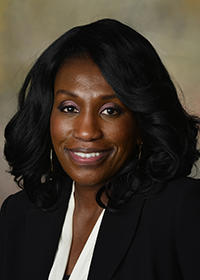Michelle S. Williams, assistant professor in the Department of Global and Community Health, shares important facts about breast cancer that are often misconstrued or misunderstood.
Breast cancer is the most common form of cancer among women in the United States. Each year in the United States, approximately 264,000 women are diagnosed with breast cancer and about 42,000 women die each year from breast cancer. Men can also develop breast cancer, although it is not as common.

During Breast Cancer Awareness Month (October), Michelle S. Williams, assistant professor in the Department of Global and Community Health, shares important facts about breast cancer that are often misconstrued or misunderstood. Williams’ research focuses on developing culturally appropriate health behavior interventions for cancer prevention and control that will lead to a reduction in cancer disparities. She is available for further comment on breast cancer prevention and early detection.
“Based on my research, many women are misinformed about breast cancer risk factors. Many women also have fears and misconceptions about mammograms,” says Williams. “Understanding your individual risks for breast cancer, obtaining age- and risk-appropriate breast cancer screenings regularly, and maintaining healthy lifestyle behaviors can lead to reductions in breast cancer mortality.”
Myth: A mammogram can cause or spread breast cancer.
Truth: Mammograms do not cause or spread breast cancer. Annual mammograms are a powerful tool to detect breast cancer early. Women with an average risk for breast cancer should get a mammogram annually starting at age 40. A health care provider may recommend them earlier if other factors make a woman’s risk for breast cancer higher than average. All women should exam their breasts monthly and report any breast changes their health care provider.
Myth: You can only get breast cancer if you have a family history of breast cancer.
Truth: Any women can develop breast cancer, regardless of family history. In fact, only about 10% of women who are diagnosed with breast cancer have a family history. An individual’s risk for breast cancer may be higher if they have a first-degree family member (female or male) who developed breast or ovarian cancer. Knowing your family history of breast cancer is important. Women with a family history of breast cancer may seek genetic counseling to assess their risk.
Myth: Breast cancer only affects women; Men don’t get breast cancer.
Truth: Men can also get breast cancer. In the U.S., approximately 2,400 men are diagnosed with breast cancer each year, and about 500 men die from breast cancer each year.
Myth: Breast cancer only affects post-menopausal women.
Truth: Breast cancer can affect women of any age. It is important to note that, the risk of breast cancer increases as a woman gets older.
Myth: If I have breast cancer, I will be able to feel a lump in my breast.
Truth: A lump in the breast is just one of the many signs and symptoms of breast cancer. Breast cancer signs and symptom can vary for each individual. Swelling of the breast, irritation of the breast skin, redness of breast or nipple, nipple discharge, change in size or shape, or pain in the breast are additional breast cancer signs and symptoms. Women should see a health care provider they feel or see any change in their breasts.
Myth: There’s nothing I can do to prevent breast cancer.
Truth: There are ways you can decrease your risk for breast cancer. Making healthy lifestyle choices including not smoking, limiting alcohol consumption, and exercising regularly can help to reduce the risk of developing breast cancer.
##
Dr. Michelle S. Williams is an assistant professor in the Department of Global and Community Health at George Mason University. Williams’ research is focused on developing culturally appropriate health behavior interventions for cancer prevention and control that will lead to a reduction in cancer disparities. Her research interests include cancer prevention behaviors, Community-Based Participatory Research, qualitative research, and the design and conduct of mixed method studies. Currently, she is conducting studies aimed at developing and evaluating mhealth (mobile health) to reduce cancer disparities in the Deep South region of the United States and in low- and middle-income countries.
For media inquiries about Mason’s faculty experts in cancer research and prevention, contact Michelle Thompson at 703-993-3485 or mthomp7@gmu.edu.
About Mason
George Mason University, Virginia’s largest public research university, enrolls 39,000 students from 130 countries and all 50 states. Located near Washington, D.C., Mason has grown rapidly over the last half-century and is recognized for its innovation and entrepreneurship, remarkable diversity, and commitment to accessibility. In 2022, Mason celebrates 50 years as an independent institution. Learn more at http://www.gmu.edu.
About the College of Health and Human Services
The College of Health and Human Services prepares students to become leaders and to shape the public's health through academic excellence, research of consequence, community outreach, and interprofessional clinical practice. The College enrolls more than 1,900 undergraduate and 1,300 graduate students in its nationally-recognized offerings, including 6 undergraduate degrees, 13 graduate degrees, and 6 certificate programs. The college is transitioning to a college of public health in the near future. For more information, visit https://chhs.gmu.edu/.
Thumbnail photo by Olya Kobruseva via pexels.
"breast" - Google News
September 27, 2022 at 05:30PM
https://ift.tt/IlSEBK7
The Truth About Breast Cancer Myths | College of Health and Human Services - College of Health and Human Services
"breast" - Google News
https://ift.tt/Fvyoj9e
https://ift.tt/46mHAKS
Bagikan Berita Ini














0 Response to "The Truth About Breast Cancer Myths | College of Health and Human Services - College of Health and Human Services"
Post a Comment